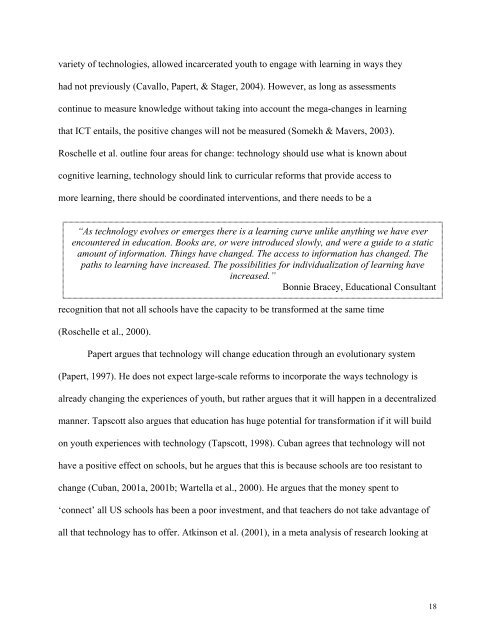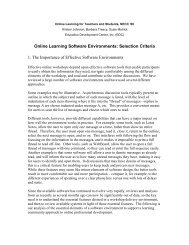It is critical to overcome the digital divide - Education Development ...
It is critical to overcome the digital divide - Education Development ...
It is critical to overcome the digital divide - Education Development ...
Create successful ePaper yourself
Turn your PDF publications into a flip-book with our unique Google optimized e-Paper software.
variety of technologies, allowed incarcerated youth <strong>to</strong> engage with learning in ways <strong>the</strong>yhad not previously (Cavallo, Papert, & Stager, 2004). However, as long as assessmentscontinue <strong>to</strong> measure knowledge without taking in<strong>to</strong> account <strong>the</strong> mega-changes in learningthat ICT entails, <strong>the</strong> positive changes will not be measured (Somekh & Mavers, 2003).Roschelle et al. outline four areas for change: technology should use what <strong>is</strong> known aboutcognitive learning, technology should link <strong>to</strong> curricular reforms that provide access <strong>to</strong>more learning, <strong>the</strong>re should be coordinated interventions, and <strong>the</strong>re needs <strong>to</strong> be a“As technology evolves or emerges <strong>the</strong>re <strong>is</strong> a learning curve unlike anything we have everencountered in education. Books are, or were introduced slowly, and were a guide <strong>to</strong> a staticamount of information. Things have changed. The access <strong>to</strong> information has changed. Thepaths <strong>to</strong> learning have increased. The possibilities for individualization of learning haveincreased.”Bonnie Bracey, <strong>Education</strong>al Consultantrecognition that not all schools have <strong>the</strong> capacity <strong>to</strong> be transformed at <strong>the</strong> same time(Roschelle et al., 2000).Papert argues that technology will change education through an evolutionary system(Papert, 1997). He does not expect large-scale reforms <strong>to</strong> incorporate <strong>the</strong> ways technology <strong>is</strong>already changing <strong>the</strong> experiences of youth, but ra<strong>the</strong>r argues that it will happen in a decentralizedmanner. Tapscott also argues that education has huge potential for transformation if it will buildon youth experiences with technology (Tapscott, 1998). Cuban agrees that technology will nothave a positive effect on schools, but he argues that th<strong>is</strong> <strong>is</strong> because schools are <strong>to</strong>o res<strong>is</strong>tant <strong>to</strong>change (Cuban, 2001a, 2001b; Wartella et al., 2000). He argues that <strong>the</strong> money spent <strong>to</strong>‘connect’ all US schools has been a poor investment, and that teachers do not take advantage ofall that technology has <strong>to</strong> offer. Atkinson et al. (2001), in a meta analys<strong>is</strong> of research looking at18
















